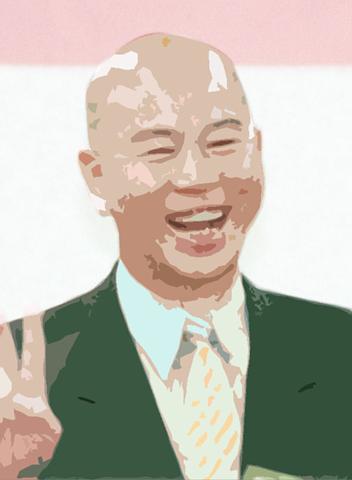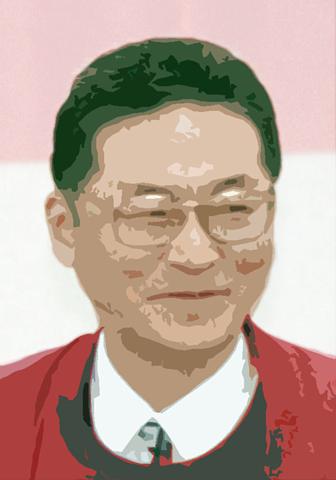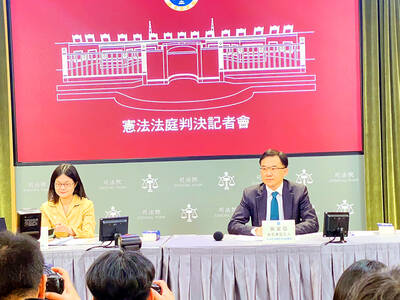The two biggest losers in yesterday's election made appeals and offered excuses as the dust settled and Chen Shui-bian
Independent candidate Hsu Hsin-liang
Hsu held a post-election press conference to congratulate Chen and to call on the public to reunite after a divisive election campaign. The former chairman of the DPP, Hsu left the party to make his ill-fated bid for the presidency.

FILE PHOTO
Hsu said he sincerely accepted the voters' choice and appealed to Chen to ease cross-strait tensions and promote the public's confidence in Taiwan's economy.
Hsu did not say much about his future nor did he directly answer speculation that he might try to found a new party.
"I never felt frustrated and will keep going," he said.

FILE PHOTO
New Party vice-presidential candidate Elmer Feng (馮滬祥) also held a post-election press conference, in the absence of the party's presidential candidate Li Ao (李敖), to blame his party's loss on a rumor, saying President Lee Teng-hui (李登輝) wanted to "Dump Lien to save Chen" (棄連保陳).
The New Party made an abysmal showing, eking out just 0.1 percent of the total, or 16,782 votes.
The convener of the New Party caucus, Hao Lung-bin (郝龍斌), said Chen's victory was mainly based on anti-China sentiment,along with Academic Sinica president Lee Yuan-tseh's (李遠哲) powerful support for Chen and the divisions within the KMT.
Hao said threatening statements from Chinese Premier Zhu Rongji (朱鎔基) triggered Taiwanese voters' negative emotions and pushed them towards Chen. However, Hao emphasized that "the [Taiwanese] anti-China complex doesn't mean that Taiwanese espouse independence."
Responding to general doubt about the New Party's future, Hao said the poor showing was not equal to the party's demise.
"Li and Feng's endeavors in the election campaign have reached the goal of promoting the New Party's propaganda," Hao said.
Li didn't even show up at the New Party's post-election press conference, saying he was not interested in the result and was happy that the election had finally come to an end. Although Li refused to join the party as a member, he stood as its candidate.

The US government has signed defense cooperation agreements with Japan and the Philippines to boost the deterrence capabilities of countries in the first island chain, a report by the National Security Bureau (NSB) showed. The main countries on the first island chain include the two nations and Taiwan. The bureau is to present the report at a meeting of the legislature’s Foreign Affairs and National Defense Committee tomorrow. The US military has deployed Typhon missile systems to Japan’s Yamaguchi Prefecture and Zambales province in the Philippines during their joint military exercises. It has also installed NMESIS anti-ship systems in Japan’s Okinawa

TRAGEDY STRIKES TAIPEI: The suspect died after falling off a building after he threw smoke grenades into Taipei Main Station and went on a killing spree in Zhongshan A 27-year-old suspect allegedly threw smoke grenades in Taipei Main Station and then proceeded to Zhongshan MRT Station in a random killing spree that resulted in the death of the suspect and two other civilians, and seven injured, including one in critical condition, as of press time last night. The suspect, identified as a man surnamed Chang Wen (張文), allegedly began the attack at Taipei Main Station, the Taipei Fire Department said, adding that it received a report at 5:24pm that smoke grenades had been thrown in the station. One man in his 50s was rushed to hospital after a cardiac arrest

ON ALERT: Taiwan’s partners would issue warnings if China attempted to use Interpol to target Taiwanese, and the global body has mechanisms to prevent it, an official said China has stationed two to four people specializing in Taiwan affairs at its embassies in several democratic countries to monitor and harass Taiwanese, actions that the host nations would not tolerate, National Security Bureau (NSB) Director-General Tsai Ming-yen (蔡明彥) said yesterday. Tsai made the comments at a meeting of the legislature’s Foreign Affairs and National Defense Committee, which asked him and Minister of National Defense Wellington Koo (顧立雄) to report on potential conflicts in the Taiwan Strait and military preparedness. Democratic Progressive Party (DPP) Legislator Michelle Lin (林楚茵) expressed concern that Beijing has posted personnel from China’s Taiwan Affairs Office to its

‘ILLEGAL RULING’: The KMT and the TPP slammed the Constitutional Court judgement, saying it contravened the law and was trying to clear the way for a ‘green dictatorship’ The Constitutional Court yesterday ruled that amendments to the Constitutional Court Procedure Act (憲法訴訟法) passed by the Legislative Yuan last year are unconstitutional, as they contravene due legislative process and separation of powers. The Legislative Yuan on Dec. 20 last year passed amendments stipulating that no fewer than 10 grand justices must take part in deliberations of the Constitutional Court, and at least nine grand justices must agree to declare a law unconstitutional. The Executive Yuan on Jan. 2 requested that lawmakers reconsider the bill, but the Legislative Yuan, under a combined majority of Chinese Nationalist Party (KMT) and Taiwan People’s Party